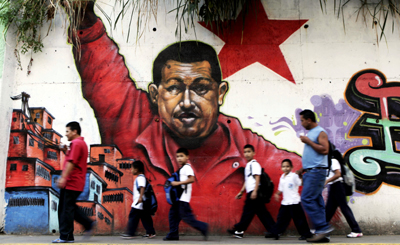Venezuelan Information Minister Andrés Izarra declared on the state television channel VTV last week that “never has so much been done to guarantee, promote, and drive freedom of expression than in the government of President Hugo Chávez.” Izarra needs to hire a fact-checker.
Contrary to Izarra’s claim, the Chávez administration’s press freedom record is poor and is getting worse. CPJ has documented the administration’s systematic suppression of critical voices by shuttering independent news outlets, harassing journalists, and enacting restrictive legislation. Izarra applauded the “diversification” of Venezuela’s media, but the Chávez administration’s media efforts have been focused on expanding the government’s own communications portfolio and stacking its personnel with loyalists. Chávez himself makes frequent use of cadenas— simultaneous nationwide radio and television broadcasts that preempt regular programming on all stations–to decry the private media’s news coverage of the government and to single out individual journalists for censure.
Are these practices that “guarantee, promote, and drive freedom of expression?”
In his statement, Izarra highlighted an increase in Venezuela’s Internet penetration, from 3 percent in 1999 to 33 percent in 2010. This might be reason to cheer if the government hadn’t just enacted legislation that applies existing, repressive broadcast regulations to Internet content. The measure was hurriedly passed in a lame-duck National Assembly session before a new–and less compliant–legislature took office.
The new law bans messages that “incite or promote hatred,” “foment citizens’ anxiety or alter public order,” “disrespect authorities,” “encourage assassination,” or “constitute war propaganda,” according to Article 8. It curbs electronic media content according to the time of the day and restricts news images showing violence. With the National Telecommunications Commission (CONATEL) now able to restrict online information as it has done with broadcast media, Izarra’s enthusiasm over Internet penetration is disingenuous. Venezuelan journalists and press freedom advocates have strongly opposed the law, CPJ found.
Chávez’s information minister also seems misinformed about the number of journalists killed in his country. He boasted Tuesday that “Venezuela can say, unlike countries like Mexico [and] Colombia, that it hasn’t seen a single work-related journalist death.”
CPJ’s database of killed journalists shows that while lethal violence is uncommon in Venezuela, three journalists have been killed for their work since 2002: Orel Sambrano, Jorge Aguirre, and Jorge Ibraín Tortoza Cruz. The motives behind the killings of three other journalists–Pierre Fould Gerges, Jesús Rafael Flores Rojas, and Mauro Marcano—are still unclear and CPJ continues to investigate.
Izarra’s claim is especially puzzling given Venezuela’s recent extradition from Colombia of Walid Makled, the man accused of masterminding Sambrano’s murder in retaliation for his investigative reporting. In addition, CPJ hailed last May’s conviction in northern Carabobo state of the trigger man, Rafael Segundo Pérez, a former police officer.
CPJ has closely documented the long-deteriorating press freedom situation in Venezuela under Chávez. Far from “guaranteeing and promoting” freedom of expression, Venezuelan authorities have worked relentlessly to quash critical voices, using state regulatory bodies and modifying legal structures to assist them in their efforts. Just check the facts.
